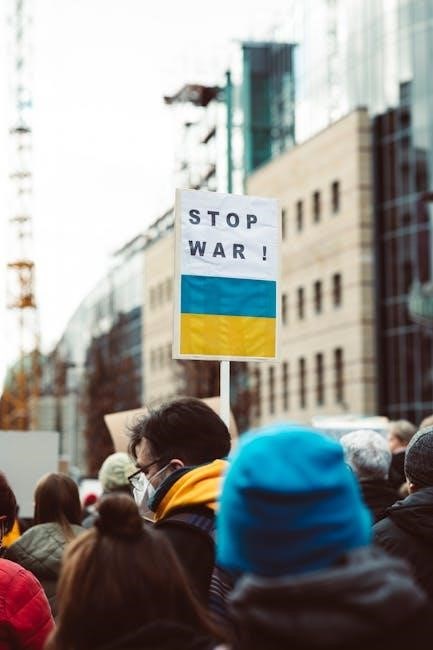Understanding the Cold War and Decolonization
The Cold War was a geopolitical rivalry between the US and USSR, while decolonization involved nations gaining independence post-WWII․ Both shaped global politics, economies, and societies․
1․1 Causes of the Cold War
The Cold War arose from ideological differences between the US and USSR, with capitalism and communism clashing as global systems․
Post-WWII power vacuums in Europe and Asia created tensions, as both superpowers sought influence and security․
Economic rivalries, such as the Marshall Plan, exacerbated divisions, while the Yalta and Potsdam conferences revealed conflicting visions for the postwar world․
The arms race and nuclear proliferation further escalated tensions, creating a state of mutual distrust and hostility․
The formation of NATO and the Warsaw Pact solidified the geopolitical divide, marking the Cold War’s institutionalization․
These factors intertwined to create a decades-long conflict that shaped global politics and international relations․
1․2 Key Events of the Cold War
The Cold War was marked by pivotal events that defined its progression․ The Berlin Blockade (1948-1949) showcased the division of Europe, while the Cuban Missile Crisis (1962) brought the world to the brink of nuclear war․ The Korean War (1950-1953) and Vietnam War (1955-1975) highlighted proxy conflicts․ The Hungarian Revolution (1956) and Prague Spring (1968) demonstrated Soviet control․ The Space Race symbolized technological rivalry․ Détente in the 1970s eased tensions, but the Soviet-Afghan War (1979-1989) reignited hostilities․ The fall of the Berlin Wall (1989) and dissolution of the USSR (1991) marked the Cold War’s end․
1․3 Ideologies of the Cold War
The Cold War was deeply rooted in ideological differences․ Capitalist democracy, led by the United States, emphasized free markets, individual freedoms, and democratic governance․ In contrast, Marxist-Leninist socialism, championed by the Soviet Union, promoted state-controlled economies, collective ownership, and a classless society․ These ideologies shaped foreign policies, alliances, and global interventions․ The US supported anti-communist regimes, while the USSR backed socialist movements․ This ideological divide fueled proxy wars, propaganda campaigns, and an arms race, creating a bipolar world order that defined international relations for decades․

Decolonization and Its Impact
Decolonization reshaped global power structures, as nations sought independence post-WWII, driven by economic strain, nationalist movements, and Cold War dynamics, leading to newly independent states and shifting alliances worldwide․
2․1 Causes of Decolonization
Decolonization was driven by economic strain, nationalist movements, and the weakening of colonial powers after WWII․ The war exposed the vulnerability of European empires, fostering anti-colonial sentiments․ Additionally, the Cold War rivalry between the US and USSR influenced decolonization, as both superpowers supported independence movements to expand their ideological reach․ Indigenous populations, inspired by self-determination and democracy, demanded freedom from colonial rule․ Economic burdens and declining legitimacy of colonial systems further accelerated the process, leading to widespread independence movements across Asia, Africa, and the Middle East․
2․2 Key Events in Decolonization
Decolonization accelerated post-WWII, with India gaining independence in 1947 and Indonesia in 1949․ The mid-20th century saw African nations like Ghana (1957) and Nigeria (1960) free themselves from colonial rule․ The Algerian War (1954–1962) marked a violent end to French colonialism․ Meanwhile, the Cold War influenced decolonization, as superpowers supported independence movements to counter each other’s influence; By the 1970s, most former colonies had achieved independence, reshaping global geopolitics and cultural identities․ These events underscored the decline of European empires and the rise of newly independent nations․
2․3 Impact of Decolonization on Global Politics
Decolonization reshaped global politics by ending European dominance and creating numerous independent nations․ It led to the emergence of the Non-Aligned Movement, as newly independent states sought to avoid Cold War alliances․ The United Nations expanded, incorporating these nations and shifting its focus to issues like development and human rights․ Decolonization also fueled Cold War rivalries, as the US and USSR competed for influence in newly independent states; This period marked a shift towards a multipolar world, emphasizing self-determination and challenging existing power structures․ The legacy continues to influence international relations and global governance today․

Relationship Between the Cold War and Decolonization
The Cold War influenced decolonization as superpowers supported independence movements to expand their ideological influence, tying national liberation to the geopolitical rivalry between capitalism and communism․
3․1 How the Cold War Influenced Decolonization
The Cold War significantly influenced decolonization by framing independence movements within the ideological battle between the US and USSR․ Both superpowers supported decolonization to expand their spheres of influence, with the US promoting democracy and capitalism, while the USSR championed socialism and communism․ This competition accelerated the decline of colonial empires as colonial powers faced pressure to grant independence․ Additionally, the Cold War provided newly independent nations with leverage to seek aid and alignment with either bloc, shaping their political and economic trajectories․
3․2 Case Studies of Decolonization During the Cold War
Case studies like India, Indonesia, and Vietnam highlight decolonization during the Cold War․ India gained independence in 1947, aligning with the Non-Aligned Movement․ Indonesia’s struggle against Dutch colonial rule was influenced by US pressure․ Vietnam’s decolonization was marked by conflict with France and eventual division, with the North aligning with the USSR and China․ These examples show how Cold War dynamics shaped decolonization, with superpowers influencing local conflicts and newly independent nations navigating geopolitical tensions while asserting their sovereignty․

Preparation for Unit 8 Study Guide
Master key terms, events, and concepts using flashcards․ Review timelines and resources to grasp Cold War dynamics and decolonization impacts, ensuring comprehensive understanding for assessments․
4․1 Key Terms and Concepts
Focus on terms like Cold War, decolonization, and anti-imperialism․ Study geopolitical rivalry, proxy wars, and ideological conflicts․ Understand decolonization causes, key events, and global impacts․ Master timelines, major players, and their roles․ Explore concepts like containment, non-alignment, and national self-determination․ Analyze technological advancements and their influences on conflicts․ Memorize flashcards covering these topics to build a solid foundation for assessments․
4․2 Study Resources and Flashcards
Utilize online platforms for comprehensive study guides and flashcards․ Quizlet offers terms like Cold War dynamics and decolonization causes․ Review timelines of major events and key ideologies․ Engage with course descriptions for college-level topics․ Explore books on globalization of the Cold War and its impacts․ Leverage unit 8 problem guides to understand interconnected trends․ Flashcards help memorize terms such as anti-imperialist sentiments and technological advancements․ These resources enhance understanding and prepare for assessments effectively․
4․3 Timeline of Major Events
Key events include the Cold War’s start post-WWII, the Berlin Blockade (1948), Korean War (1950-1953), Cuban Missile Crisis (1962), and the fall of the Berlin Wall (1989)․ Decolonization highlights include India’s independence (1947), African nations gaining independence in the 1960s, and South Africa ending apartheid (1994)․ These events shaped global geopolitics and societal changes, illustrating the intertwined Cold War and decolonization dynamics․

Assessment and Evaluation
Assessment includes essay questions, multiple-choice tests, and group projects, evaluating understanding of Cold War dynamics, decolonization impacts, and their global interconnections․
5․1 Essay Questions and Argumentation Skills
Essay questions will assess your ability to analyze the Cold War’s impact on decolonization, evaluating causes, consequences, and global interconnections․ You’ll need to develop clear arguments, supported by historical evidence, comparing ideologies and their influence on independence movements․ Topics may include the role of superpowers, economic factors, and the legacy of colonialism․ Emphasize critical thinking and the ability to synthesize complex information into coherent, well-structured responses․ Practice articulating your understanding of key events and their long-term effects on modern geopolitics and societal structures․
5․2 Multiple-Choice Questions and Key Themes
Multiple-choice questions will test your understanding of key events, ideologies, and the interplay between the Cold War and decolonization․ Themes include superpower rivalry, independence movements, and global impacts․ Questions may ask about causes of decolonization, major events like the Cuban Missile Crisis, and the roles of leaders․ Focus on identifying correct terms, analyzing causes and effects, and recognizing global shifts in power․ Practice with sample questions to build familiarity with the format and content, ensuring a strong grasp of Unit 8’s core concepts and their historical significance․
5․3 Group Projects and Presentations
Group projects and presentations are designed to foster collaboration and deeper understanding of Unit 8 topics․ Students will analyze historical events, compare case studies, and explore the Cold War’s impact on decolonization․ Topics may include the roles of superpowers, independence movements, and global economic shifts․ Presentations will require clear communication, visual aids, and critical thinking; Peer feedback and participation are key components of assessment․ These activities encourage students to synthesize information, develop argumentation skills, and demonstrate mastery of key themes in a collaborative setting, preparing them for comprehensive evaluations․
The Cold War’s end marked a shift in global power dynamics, while decolonization reshaped nations’ sovereignty and identity․ Both legacies continue to influence modern political and social landscapes․
6․1 The End of the Cold War and Its Legacy
The Cold War concluded with the dissolution of the Soviet Union in 1991, marking a significant shift in global geopolitics․ The fall of the Berlin Wall in 1989 symbolized the decline of communist influence․ This period ushered in a unipolar world dominated by the United States, reshaping international relations․ The legacy includes the spread of democratic ideals and free-market economies, though it also left economic challenges in post-Soviet states․ The end of the Cold War influenced decolonization’s final stages, as newly independent nations navigated a world no longer defined by superpower rivalry, creating opportunities and challenges for global stability and cooperation․
6․2 The Legacy of Decolonization in the Modern World
Decolonization reshaped the modern world by ending colonial empires and promoting self-determination․ It led to the emergence of numerous independent nations, particularly in Africa and Asia․ The legacy includes cultural identity resurgence and global diversity․ However, challenges like economic disparities and political instability persist in some post-colonial states․ Decolonization also influenced global governance, with organizations like the United Nations emphasizing sovereignty and human rights․ Its impact is evident in ongoing discussions about reparations, cultural restitution, and addressing colonial histories, shaping contemporary international relations and social justice movements worldwide․
6․3 Final Thoughts and Reflections
Reflecting on Unit 8, the Cold War and decolonization were pivotal in shaping the modern world․ The Cold War’s ideological battles and proxy conflicts influenced global power dynamics, while decolonization reshaped nations’ sovereignty․ Together, these events underscored the importance of self-determination and geopolitical competition․ Students should consider how these historical trends continue to affect contemporary issues like international relations, economic inequality, and social justice․ Understanding these connections fosters a deeper appreciation of global complexities and encourages critical thinking about the past’s impact on the present and future․

